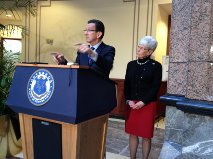 Governor Dannel P. Malloy will introduce legislation to battle heroin and prescription narcotics abuse. He will call for fast-track prescription reporting, requirements for regular education for doctors and pharmacists and wider use of naloxone, which can reverse the effects of overdoses.
Governor Dannel P. Malloy will introduce legislation to battle heroin and prescription narcotics abuse. He will call for fast-track prescription reporting, requirements for regular education for doctors and pharmacists and wider use of naloxone, which can reverse the effects of overdoses.
“I’ve been clear that, as a state, we need to be smarter about how we approach punishment with our drug laws,” Malloy said in a statement this afternoon. “But we also need to be more diligent about preventing addiction in the first place. That’s why we’re proposing legislation that will ensure health care professionals check accurate, real-time data to help them make smart decisions and curb potential abuse. Opioid abuse has historically been viewed as an isolated problem, but trends from across the nation demonstrate that it is affecting communities, both large and small. Connecticut is taking smart, preventative action to streamline processes and prevent potential addiction.”
From Malloy’s news release:
“To combat addiction, Governor Malloy’s legislation will streamline the process to help practitioners identify potential abuse by alerting them if patients seeking certain prescriptions have recently received these medications from multiple other prescribers or pharmacists. The proposal requires all pharmacies in Connecticut to report the dispensing of prescriptions for all controlled substances immediately – rather than weekly – through the state’s prescription monitoring program (PMP), helping ensure that prescribers have accurate, real-time data for treatment decisions. It also requires any prescriber supplying more than a 72-hour supply of a controlled substance to review the patient’s record in the PMP, allowing emergency departments and others prescribing very short term prescriptions the expediency they need while working to prevent potential abuse for longer-term prescriptions. Further, in cases of overdose or medical emergency, the legislation saves lives by making naloxone – a drug that reverses overdoses – more widely available, allowing pharmacists, after being trained and certified through the Department of Consumer Protection, to prescribe it to Connecticut families, first responders, and the treatment community across the state. The legislation also requires more education on the issue for medical professionals as part of the existing process for them to renew their licenses. It also reconstitutes the Alcohol and Drug Policy Council, led by the Department of Mental Health and Addiction Services and the Department of Children and Families, to focus on addiction in Connecticut and inform the Governor and General Assembly on future policy changes and public awareness strategies necessary to combat addiction. Governor Malloy’s administration has already taken important steps to combat substance abuse and opioid overdose in Connecticut. Good Samaritan laws passed in 2012 have encouraged more people to call 911 in order to save the life of a friend or loved one who may be overdosing. Third-party prescription laws passed in 2014 now allow practitioners to prescribe naloxone to anyone who can treat or prevent a drug overdose, such as family members or friends of suspected opioid abusers, a practice that has saved countless lives. Moreover, Connecticut State Police now universally carry naloxone in their cruisers, a step which has saved 13 lives in the few short months since implementation in October 2014.”